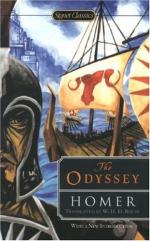{14} I imagine this passage to be a rejoinder to “Il.” xxiii. 702-705 in which a tripod is valued at twelve oxen, and a good useful maid of all work at only four. The scrupulous regard of Laertes for his wife’s feelings is of a piece with the extreme jealousy for the honour of woman, which is manifest throughout the “Odyssey”.
{15} [Greek] “The [Greek], or tunica, was a shirt or shift, and served as the chief under garment of the Greeks and Romans, whether men or women.” Smith’s Dictionary of Greek and Roman Antiquities, under “Tunica”.
{16} Doors fastened to all intents and purposes as here described may be seen in the older houses at Trapani. There is a slot on the outer side of the door by means of which a person who has left the room can shoot the bolt. My bedroom at the Albergo Centrale was fastened in this way.
{17} [Greek] So we vulgarly say “had cooked his goose,” or “had settled his hash.” Aegyptus cannot of course know of the fate Antiphus had met with, for there had as yet been no news of or from Ulysses.
{18} “Il.” xxii. 416. [Greek] The authoress has bungled by borrowing these words verbatim from the “Iliad”, without prefixing the necessary “do not,” which I have supplied.
{19} i.e. you have money, and could pay when I got judgment, whereas the suitors are men of straw.
{20} cf. “Il.” ii. 76. [Greek]. The Odyssean passage runs [Greek]. Is it possible not to suspect that the name Mentor was coined upon that of Nestor?
{21} i.e. in the outer court, and in the uncovered part of the inner house.
{22} This would be fair from Sicily, which was doing duty for Ithaca in the mind of the writer, but a North wind would have been preferable for a voyage from the real Ithaca to Pylos.
{23} [Greek] The wind does not whistle over waves. It only whistles through rigging or some other obstacle that cuts it.
{24} cf. “Il.” v.20. [Greek] The Odyssean line is [Greek]. There can be no doubt that the Odyssean line was suggested by the Iliadic, but nothing can explain why Idaeus jumping from his chariot should suggest to the writer of the “Odyssey” the sun jumping from the sea. The probability is that she never gave the matter a thought, but took the line in question as an effect of saturation with the “Iliad,” and of unconscious cerebration. The “Odyssey” contains many such examples.
{25} The heart, liver, lights, kidneys, etc. were taken out from the inside and eaten first as being more readily cooked; the [Greek], or bone meat, was cooking while the [Greek] or inward parts were being eaten. I imagine that the thigh bones made a kind of gridiron, while at the same time the marrow inside them got cooked.
{26} i.e. skewers, either single, double, or even five pronged. The meat would be pierced with the skewer, and laid over the ashes to grill—the two ends of the skewer being supported in whatever way convenient. Meat so cooking may be seen in any eating house in Smyrna, or any Eastern town. When I rode across the Troad from the Dardanelles to Hissarlik and Mount Ida, I noticed that my dragoman and his men did all our outdoor cooking exactly in the Odyssean and Iliadic fashion.




